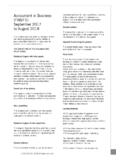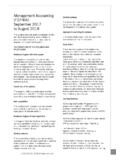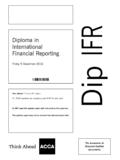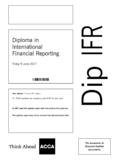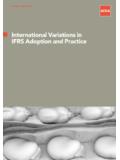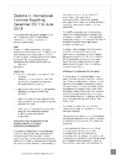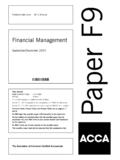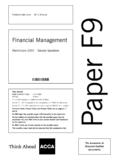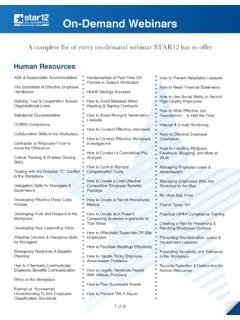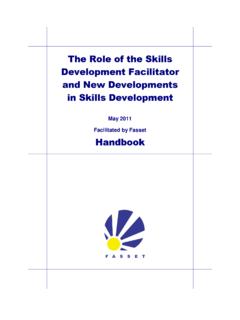Transcription of Achieve - accaglobal.com
1 AchievePerformance objectivesTrainees are required to Achieve nine performance objectives in total all five Essentials performance objectives and any four Technical performance objectives. Performance objectives are divided into 10 areas which are closely linked to the exam syllabus reinforcing that any knowledge developed through the exams process will have a clear application in the performance objectives are made up of a description, elements which describe the skills and experience trainees must demonstrate, and a statement where they summarise and reflect on the work activities they have undertaken to meet the performance objective description. Trainees will need to claim five elements and complete a statement for each performance objective. Trainees can claim elements individually as they Achieve trainee is required to plan with their practical experience supervisor which performance objectives they aim to Achieve . This process will help both to identify which performance objectives the trainee can realistically Achieve in their current role.
2 Trainees should consider: their role and responsibilities opportunities for gaining experience which exams they have passed or are currently studying. As an employer or practical experience supervisor, you should encourage trainees to think about ways they can Achieve performance objectives and provide opportunities for them to do this eg secondments or job rotations, project work, or learning and undertaking new responsibilities. These types of activities will help the trainee to meet ACCA s practical experience requirements and benefit the organisation in which they work. Once the practical experience supervisor and the trainee have identified which performance objectives the trainee is going to Achieve , the trainee will need to complete a period of work where they are gaining experience and developing their skills. The practical experience supervisor and the trainee will then need to review this experience. Using My Experience trainees will need to claim the elements and write a statement that relates to the performance objective they are working towards achieving.
3 Practical experience supervisors will need to review and sign-off the performance objective if the trainee has achieved it or alternatively, provide further guidance on what future activity needs to be completed. The table opposite outlines the performance objectives. Detailed information to guide trainees on each performance objective is contained within this objectives are benchmarks of effective performance that describe the types of work activities students and affiliates will be involved in as trainee accountants. They also outline the values and attitudes trainees should demonstrate as they fulfil their practical experience requirements. Achieve PERFORMANCE OBJECTIVES HANDBOOK2 Achieve PERFORMANCE OBJECTIVES HANDBOOKACHIEVE PERFORMANCE OBJECTIVES HANDBOOKESSENTIALS complete all five1 Professionalism and ethics2 Stakeholder relationship management3 Strategy and innovation4 Governance risk and control5 Leadership and managementTECHNICAL choose any fourCorporate reporting6 Record and process transactions and events7 Prepare external financial reports8 Analyse and interpret financial reportsFinancial management9 Evaluate investment and financing decisions10 Manage and control working capital11 Identify and manage financial riskSustainable management accounting12 Evaluate management accounting systems13 Plan and control performance14 Monitor performanceTaxation15 Tax computations and assessments16 Tax compliance and verification17 Tax planning and adviceAudit and assurance18 Prepare for and plan the audit process19 Collect and evaluate evidence for an audit20 Review and report
4 On the findings of an auditPerformance objectives3 Achieve PERFORMANCE OBJECTIVES HANDBOOKACHIEVE PERFORMANCE OBJECTIVES HANDBOOKPO1 PROFESSIONALISM AND ETHICSD escription The fundamental principles of ethical behaviour mean you should always act in the wider public interest. You need to take into account all relevant information and use professional judgement, your personal values and scepticism to evaluate data and make decisions. You should identify right from wrong and escalate anything of concern. You also need to make sure that your skills, knowledge and behaviour are up-to-date and allow you to be effective in your a Act diligently and honestly, following codes of conduct, taking into account and keeping up-to-date with Act with integrity, objectivity, professional competence and due care and confidentiality. You should raise concerns about Develop a commitment to your personal and professional knowledge and development. You should become a life-long learner and continuous improver, seeking feedback and reflect on your contribution and Identify, extract, process and evaluate information to make reliable, well-reasoned Check, critically analyse and assess financial and other data with professional scepticism.
5 You should question opinion and facts through corroboration and robust activities Applying legislation appropriately to client needs. Continually reviewing legislation and regulation that affects your working environment. Briefing a team on a new standard and how to apply it. Keeping sensitive information confidential and disclosing only to those who need it or when disclosure is legally required. Recognising unethical behaviour and telling your line manager about what you have seen. Avoiding situations where there may be any threat to your professional Performance ObjectivesACHIEVE PERFORMANCE OBJECTIVES HANDBOOK4 Deciding what information is important and reliable, using it to support your decision making. Completing all the code of conduct and/or professional ethics training provided by your organisation. Checking transactions and supporting documents to verify the accuracy of accounting exams Links to all STAKEHOLDER RELATIONSHIP MANAGEMENTD escription You manage stakeholder expectations and needs, developing and maintaining productive business relationships.
6 You listen to and engage stakeholders effectively and communicate the right information to them when they need Display sensitivity, empathy and cultural awareness in all your communications. This allows you to establish trust and credibility with a range of stakeholders and gain their Use a range of mediums and make appropriate use of IT to communicate clearly, concisely and persuasively in formal and informal Gain commitment from stakeholders by consulting and influencing them to solve problems, meet objectives and maximise mutually beneficial Develop and build effective and ethical professional relationships and Deal calmly and efficiently with conflicting priorities, deadlines or opinions both internally and externally by listening and activities Communicating in a way that suits the audience or audiences, using the right tone, style and medium. This could include communicating with clients from different cultures. Developing relationships in meetings that lead to positive outcomes.
7 Discussing work problems with colleagues or clients to improve and maintain relationships. Planning for and engaging positively with the appraisal process. Using media and technology to contribute to business -related discussions for example, contributing to intranet community conversations, hosting teleconferences or making online presentations. Presenting internally or externally. Participating effectively in interviews. Drafting reports effectively. Dealing well with conflicting deadlines or requirements. Acting responsibly and with maturity when there are disagreements. Addressing service level complaints. Engaging with internal customers throughout the organisation. Discussing expectations of your work with your supervisor. Working within your supervisor s requirements and giving them regular progress updates. Networking at conferences, internally or by joining business -related exams F1, Accountant in BusinessF7, Financial ReportingP1, Governance, Risk and Ethics P2, Corporate ReportingP3, business AnalystP4, Advanced Financial PERFORMANCE OBJECTIVES HANDBOOKPO3 STRATEGY AND INNOVATIOND escription You contribute to the wider business strategy of your organisation through your personal and team objectives.
8 You identify innovative ways to improve organisational performance which may include making or recommending business process changes and a Research and be familiar with your employer s business , the sector it operates within and the wider business Listen to and learn from colleagues and experts. Anticipate challenges, show openness and contribute to new ideas and Plan, identify and monitor your personal targets and standards of delivery so that they meet the wider departmental and strategic objectives of your Think systematically, critically and innovatively when you re solving business Develop financial acumen and sound business judgement. This will allow you to anticipate potential business problems, recognise weaknesses and propose activities Using market data to research competitor activities. Attending courses or conferences that will help you with your work. Highlighting business problems or system issues. Planning or managing a project.
9 Proposing innovative and practical ideas. Discussing general business matters with your colleagues. Thinking creatively and speaking openly about business issues and how to solve them. Using online resources to develop commercial awareness. This could include using social and business media to develop your business networks. Highlighting issues at work which cause ineffectiveness or inefficiencies and recommending solutions. Improving organisational systems/tools to drive innovation or process improvement. Obtaining information from other departments to evaluate performance or suggest business examsP3, business AnalystP4, Advanced Financial ManagementP5, Advanced Performance GOVERNANCE RISK AND CONTROLD escription You contribute to effective governance in your area. You evaluate, monitor and implement risk management procedures, complying with the spirit and the letter of policies, laws and a Provide and present information at the appropriate time to comply with organisational requirements and external Operate according to the governance standards, policies and controls of your organisation.
10 You also review your work and your colleagues work to make sure it Evaluate and identify areas of risk assessing the probability of fraud, error and other hazards in your area of responsibility, and the impact they would Assess the risk of failures in the internal controls and procedures in your area of responsibility. e Consult with stakeholders and specialists, communicating with them to solve problems and reach activities Collating data on risks and assessing their likelihood and potential impact. When you identify risks, bringing them to the attention of your line manager. Complying with authorisation limits and other internal PERFORMANCE OBJECTIVES HANDBOOK6 Complying with money laundering legislation or regulation and reporting any suspicious activities. Briefing a team on a new policy, procedure or methodology. Creating and/or updating policies and/or process documentation/procedures. Training staff on recent compliance issues. Reviewing policies, processes or procedures following audit reviews and revise them accordingly.
